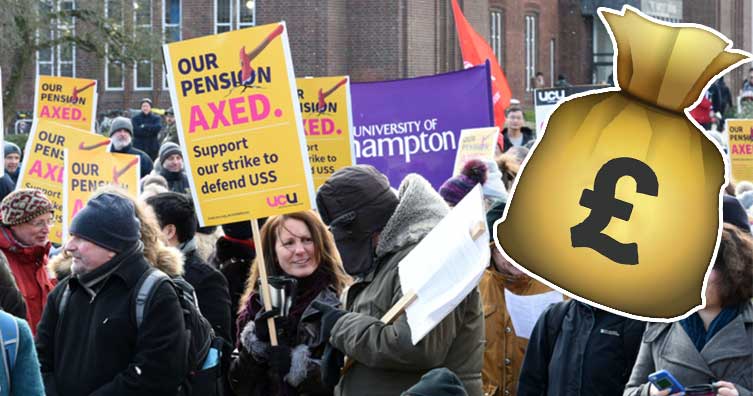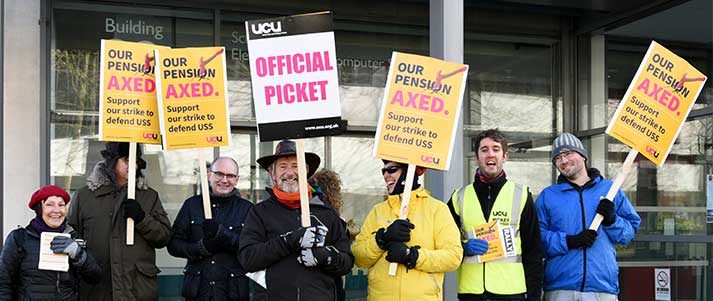You could be owed THIS much if you were affected by the 2018 lecturer strikes
Did you miss out on valuable class time when lecturers went on strike in 2018? A lot of students complained – and some got a fair amount back in compensation.

Credit: Sasa Wick – Shutterstock
In 2018, student complaints to a watchdog were the highest they had been in four years, but it's maybe not that surprising.
In a year which saw lecturers across the UK striking over changes to the USS pension scheme, while tuition fees remained at the high figure of £9,250 a year, it wasn't the easiest year for students.
During the strike, many lecturers temporarily stopped teaching, marking and doing research, and this had a big impact on a lot of students' learning (which they'd paid good money for).
The Office of the Independent Adjudicator for Higher Education (OIA) are there to deal with unresolved complaints by uni students in England. Among the 1,967 complaints they received from students in 2018, around 50 were about the USS pension strike.
What were the student complaints about?

Credit: Sasa Wick – Shutterstock
Most of the complaints to the OIA in 2018 about the strikes were about the value for money of degrees. When lecturers took industrial action, a lot of students weren't getting the hours of teaching they'd paid for.
Some of the complaints were also about how the strikes impacted students' academic performance.
Our editor, Jess Aszkenasy, was doing a one-year master's course during the 2018 strikes. She felt that the lost teaching hours disrupted her studies. Jess said:
I think universities should definitely be compensating students when it can be proved that the strike had a major impact on contact time with professors.
I was on a one-year master's course and most of my professors were on strike that semester. I supported their reasons for striking, but this also meant that I lost out on a lot of valuable hours of teaching, which completely disrupted the whole of the second semester.
It's sad to say, but universities in the UK are essentially run like businesses. When you enroll, you're signing a contract between yourself and the university which is providing the service of education. In this instance, the university didn't fulfil its obligations and should compensate its students.
Felicity Mitchell, an Independent Adjudicator from the OIA, argued that some universities did more than others to make up for lost teaching time from the industrial action. She said:
Some providers have made lecture recordings, podcasts, and additional on-line materials available to students, or allowed them to sit in on other classes. Others have done nothing, and we don’t think that’s fair.
How much have students got in compensation?

Credit: Watchara Ritjan – Shutterstock
The amount students have received so far in compensation has varied a lot, depending on the university and individual circumstances of each student who has complained.
One student who approached the OIA about the industrial action was an international student who complained about lost teaching hours from the strikes – their university was recommended to refund them £1,283.75 by the OIA.
After their initial complaint to the university, this student had been told that the institution relied on a widely drafted 'force majeure' clause in its T&Cs. A 'force majeure' clause basically means that they aren't obliged to carry out their contractual promises if issues arise that are out of their control.
The OIA decided that the uni had taken steps to reduce the impact of the strikes on students, but it was unfair of them to rely on a 'force majeure' clause to respond to the complaint.
They decided that the clause's scope was too wide, and it hadn't been brought to the student's attention early enough. As the student hadn't been aware of it, the consumer protection legislation was brought up as a potential reason for compensation. For times like this, it's super important to know your consumer rights as students.
Other unis, though, have responded to the strikes differently, making efforts to help students who lost out on teaching hours.
Ahead of the strikes, students from the University of Sheffield ran a petition on Change.org urging their uni to compensate them £300 each for their lost teaching hours. It had over 7,600 signatures.
It was set up by Sam Dickinson, who said on the petition:
As consumers, we must protest against losing what we pay so much for.
This petition is not designed to negate the reasons for strike action. It simply aims to seek compensation for the repercussions and neglect that this strike imposes on students during term time.
Instead of offering the compensation requested in the petition, the University of Sheffield decided to use the money that would've been paid in earnings to lecturers during the strikes for projects that aimed to benefit students.
A spokesperson from the University of Sheffield said:
Following last year's UCU strike action, and in discussions with the SU Officers and local UCU branch representatives, we agreed that the money which was not paid to those striking would be allocated to provide additional support to benefit students across the university – including greater access to mental wellbeing support, improving study spaces and supporting students with fieldwork and dissertation costs.
We have published full details of how this money has been allocated on our website.
This article was updated after a response from the University of Sheffield.
For advice on how to claim compensation from your university, check out our guide.








